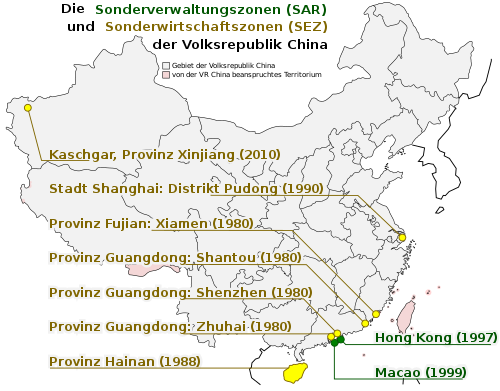Special administrative regions of China
![]()
This article or subsequent section is not sufficiently supported by evidence (for example, itemizations). Information without sufficient evidence may be removed soon. Please help Wikipedia by researching the information and adding good supporting evidence.
The Special Administrative Region (Chinese 特別行政區 / 特别行政区, pinyin![]() , Jyutping Dak6bit6 Hang4zing3keoi1, Yale Dak6bit6 Hang4jing3keui1
, Jyutping Dak6bit6 Hang4zing3keoi1, Yale Dak6bit6 Hang4jing3keui1 ![]() , IPA (Cantonese) [tɐk6piːt6 hɐŋ4tsɪŋ3kʰɵy1], English Special Administrative Region, short: SAR; Portuguese
, IPA (Cantonese) [tɐk6piːt6 hɐŋ4tsɪŋ3kʰɵy1], English Special Administrative Region, short: SAR; Portuguese![]() ) is an administrative unit in the People's Republic of China. Currently, there are two special administrative regions at the national level, Hong Kong and Macau, each with a chief government official of the special administrative region, the chief executive, or "chief administrator," as head of government. In addition, there is the Wolong Special Administrative Region (en) in Sichuan Province, which has a different legal status.
) is an administrative unit in the People's Republic of China. Currently, there are two special administrative regions at the national level, Hong Kong and Macau, each with a chief government official of the special administrative region, the chief executive, or "chief administrator," as head of government. In addition, there is the Wolong Special Administrative Region (en) in Sichuan Province, which has a different legal status.
Special administrative zones were established on the basis of Article 31 of the Constitution of the People's Republic of China. This article allows the National People's Congress to establish special administrative zones and provide them with a basic law, a high degree of internal autonomy, their own political and economic system.
The principle of one country, two systems, on which the Special Administrative Regions are based, was developed by Deng Xiaoping. In 1984, he explained it in a speech to Hong Kong notables. One country meant the People's Republic of China, and the special administrative region was considered a local government within the framework of the People's Republic of China. In the same speech, Deng also explained the principle of Hong Kong administration by Hong Kongers. According to this, Beijing would not send any officials to govern the Special Administrative Region, but only station troops as a symbol of state sovereignty in the then Crown Colony.
The People's Republic of China has offered Taiwan the status of a special administrative region in the event of reunification. The latter does not accept this, however, and surveys indicate that this principle is also rejected by the majority of Taiwanese voters.
The special administrative regions, although not sovereign states, have their own customs administrations and trade policies. They are also members of the WTO in their own right.

The Special Administrative Zones and Special Economic Zones of the People's Republic of China
Questions and Answers
Q: What is a Special Administrative Region (SAR)?
A: A Special Administrative Region (SAR) is a region in China that has a high level of autonomy, or a lot of power to rule itself.
Q: How many SAR's are there in China?
A: There are two SAR's in China, Hong Kong and Macau.
Q: What is the Basic Law?
A: The Basic Law is a constitution that is different from that of the People's Republic of China (PRC). It allows Hong Kong and Macau to have freedoms that are not present in the rest of China, such as freedom of religion, speech, press, assembly and petition. Additionally, it allows them to decide their own economic rules.
Q: What does the "one country, two systems" policy refer to?
A: The "one country, two systems" policy refers to the fact that both SARs have their own currencies, passports official languages etc., while still being part of one country - mainland China.
Q: Which language is spoken most commonly in these areas?
A: Cantonese is the most spoken language in these areas.
Q: Are English and Portuguese also official languages in these regions? A: Yes, English and Portuguese are also official languages in respective SARs due to their past control over those regions.
Search within the encyclopedia